
views
Own your mistake, if you made one.

Take responsibility for what happened instead of pushing it aside. Unfortunately, ignoring the situation won’t get you off the hot seat. Instead, it’ll just emphasize the situation. Take a moment to accept responsibility for the error, so the situation isn’t left up in the air. You might say “Whoops! That’s my fault” or “This is on me.” Even saying “awkward!” can help lighten things up.
Fix the mistake.

Solving the problem is a lot more productive than passing the blame. Pointing the finger is a perfectly natural reaction during an embarrassing moment, but it doesn’t accomplish much in the long run. Instead of dwelling on the who and why of the situation, focus on how you can make the situation better. A plan of action will really help things simmer down. If you missed a deadline for your boss, you might volunteer to finish up the assignment during your personal time. If you spill your drink over someone’s jacket, you could offer to pay for dry cleaning.
Laugh it off if it's a minor embarassment.
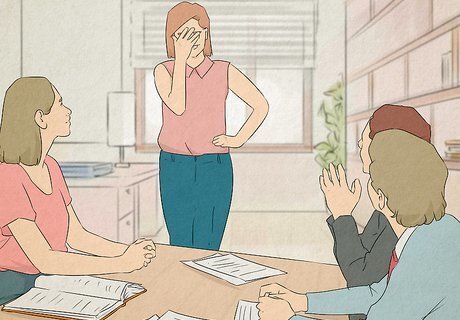
Laughing at yourself is actually good for your health. Research shows that “adaptive humor,” or the ability to laugh at yourself, improves your heart health, boosts your pain threshold, and helps your short-term memory. Instead of beating yourself up over a mistake, laugh at the situation instead. You’ll feel a lot better afterward, and you’ll actually be improving your health! If you go to work with your shirt inside-out, you might laugh and say something like, “Guess I forgot to turn the lights on this morning.” If you jam the printer by mistake, you might say, “It looks like the printer needs the paper more than I do.” Laughter may not be the best solution in every situation—try reading the room to see if laughter might lighten things up or make the situation worse.
Use “I feel” statements instead of “I am.”

Adjust your thought patterns so you don’t beat yourself up. Identify and address any mean, harsh thoughts you’re thinking about yourself. Try changing your thoughts from “I am” statements to “I feel,” “I did,” or “I experienced” statements instead. This helps you to separate yourself from your mistake while still acknowledging that it happened. Instead of thinking “I’m an idiot for spilling coffee everywhere,” think, “I feel badly that I spilled coffee over the table, but I’ll be extra careful next time.” Instead of telling yourself, “I’m so stupid for sending that email to the wrong person,” think, “I didn’t double-check before sending my message, but I’ll be more careful next time.”
Reverse the situation to get a new perspective.
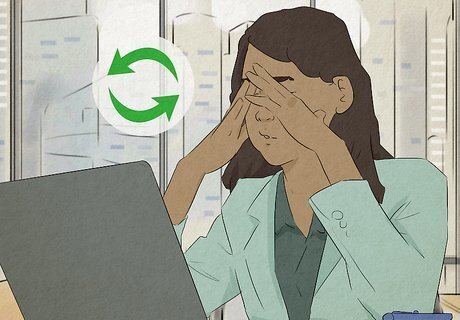
You’re not the first person to feel embarrassed, and you definitely won’t be the last. During an embarrassing moment, we tend to experience “empathy neglect,” where we blame and judge ourselves without factoring in the empathy of the people nearby. Think of it this way—if your co-worker did something embarrassing, you wouldn’t be thinking mean, judgmental things, right? Chances are, they aren’t thinking mean, harsh things about you, either. In some cases, your co-workers might not even notice the mistake or mishap that you’re embarrassed about.
Think about your accomplishments.

Your embarrassing moments don’t define your worth. Instead, think about everything you’ve accomplished at your job and the positive impact you’ve had. An embarrassing moment doesn’t change or erase your past achievements. Write down all of these positives, so you can focus on them instead. You might recall a time your boss complimented you, or times you covered for a co-worker.
Recall past mistakes you’ve lived through.
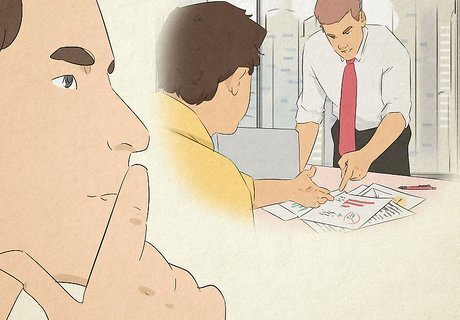
Put your mistake in perspective. Recall an event or situation that was really stressful or embarrassing at the time. Then, remember how you were able to overcome that experience and come out stronger. While it may be unpleasant now, you will make it past this moment! You might recall a mistake you made in high school or college, or an error you made at a past job.
Listen to someone else’s embarrassing story.

Ask someone about an embarrassing situation they went through. Let them share their experience with you, and remind yourself that you aren’t alone in how you’re feeling. Sharing tales is a great way to gain perspective in the long run.
Let it go.
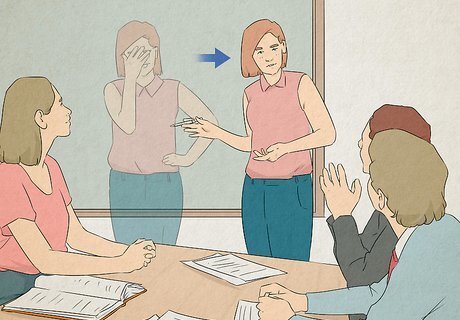
Leave your mistake in the past and look toward the future. There’s nothing else you can do after you’ve acknowledged your embarrassing moment and done your best to make things right. In the future, focus on being the best you can possibly be. “Letting it go” can be a lot easier said than done. Remind yourself that no one is perfect, and everyone has embarrassing moments sometimes. It might help to remind yourself that your co-workers and superiors have their own lives, and aren’t fixated on your slip-up.


















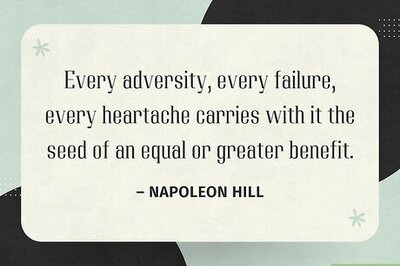

Comments
0 comment